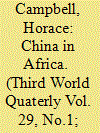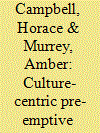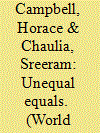| Srl | Item |
| 1 |
ID:
081215


|
|
|
|
|
| Publication |
2008.
|
| Summary/Abstract |
In the first decade of the 21st century China has been able to enter political, military and commercial deals with countries of the asean community, the countries of Latin America and the Caribbean, and the countries and observers in the Shanghai Cooperation Organization (sco). In November 2006 China sealed this circle with a strategic partnership with Africa at a major feast of leaders celebrating the friendship and co-operation between the two. The emergence of China as a force in Africa complicated the tussle between the EU and the USA over the 'who controls Africa'. The new relations between Africa and China could be described in the words of Gramsci, as, 'the old is dying yet the new is yet to be born'. Chinese relations with Africa combine elements of the old (extraction of raw materials), yet the experience of transformation in China ensures that there are many positive and negative lessons to be learnt. What is new is the prospect for the consolidation of African independence and the challenge to the hegemony of the dollar and US imperialism. I argue in this paper that, in the short term, one of China's most important roles will be to break the disarticulation between the financial and productive sectors of the economy and to stem the outflow of capital from Africa. In the long run the experience of linking new ideas of science and technology to a home grown path of reconstruction can be an important lesson for Africa. State-to-state relations are usually opportunistic and it is for this reason that transnational civil society linkages between the Chinese and African people will be more important than relations between leaders
|
|
|
|
|
|
|
|
|
|
|
|
|
|
|
|
| 2 |
ID:
134403


|
|
|
|
|
| Summary/Abstract |
The twenty-first century has seen a continued evolution of the US military’s strategic interest in socio-cultural knowledge of (potential) adversaries for counterinsurgency strategies. This paper explores the implications of the reinvigorated and expanding (post-9/11) relationship between social science research and US military strategy, assessing the implications of US Africa Command strategies for preventive counterinsurgency. Preventative counterinsurgency measures are ‘Phase Zero’ or ‘contingency’ operations that seek to prevent possible outcomes, namely threats to ‘security’ in Africa. The research initiatives of US Africa Command illustrate a culture-centric approach to this strategy, which seeks to draw from detailed socio-cultural knowledge in the prevention of possible populist or popular uprisings. Recent such uprisings, resistance actions and strikes in the continent illustrate a problematic tendency to interpret various forms of populist resistance as ‘terrorist’ actions, thereby condoning the bolstering of African national military capacity. The article considers the implications of these culture-centric counterinsurgency strategies as a means of anticipating and repressing the variety of mobilisations encapsulated within the ‘terrorism’ catchall. We conclude by urging social scientists to reject and disconnect from US Africa Command’s missions and knowledge acquisition efforts in Africa.
|
|
|
|
|
|
|
|
|
|
|
|
|
|
|
|
| 3 |
ID:
087414


|
|
|